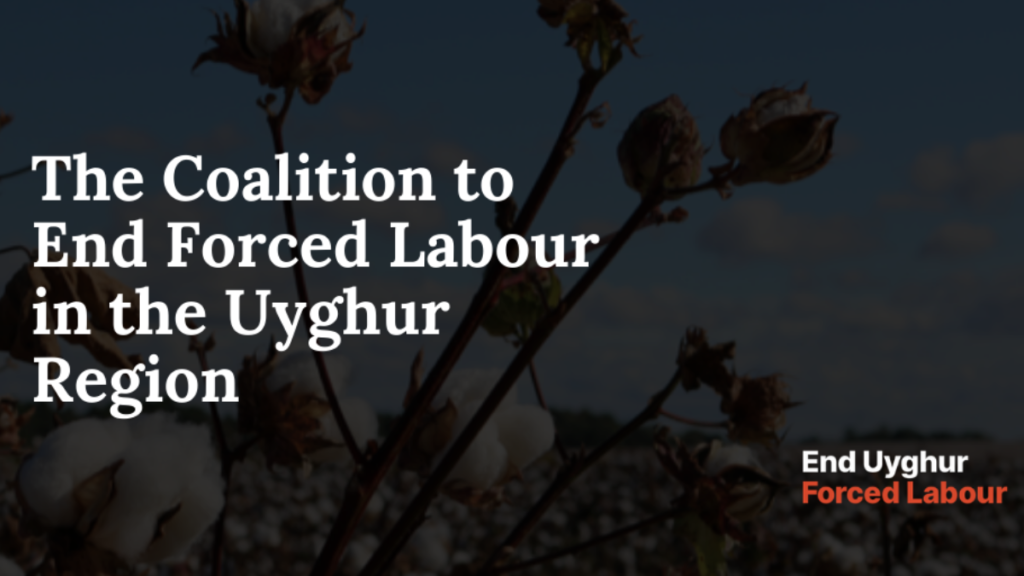Businesses Must Immediately Exit the Uyghur Region

February 28, 2024
[Below is a statement by the Coalition to End Forced Labour in the Uyghur Region, for which the Uyghur Human Rights Project is a Steering Committee Member]
Companies must end complicity in state-sponsored forced labour and crimes against humanity
All companies with operations in the Xinjiang Uyghur Autonomous Region (Uyghur Region) should immediately exit the Region. Recent news that BASF, a chemical producer operating in 16 industries, will divest from its joint ventures in the Uyghur Region should signal to all other companies that it is past time to end business operations in the Uyghur Region. The government of China’s well-documented repression against Uyghurs and other Turkic and Muslim-majority peoples includes mass arbitrary detention and systematic state-imposed forced labour and may constitute crimes against humanity, according to UN human rights experts. Cutting ties to the Uyghur Region will have a tangible impact on forced labour and is essential to ending the crimes against humanity taking place.
Due to the widespread repression in the Uyghur Region and the Chinese government’s pervasive state-imposed forced labour programmes, there are no valid means to conduct audits, certification processes, or to credibly or safely engage with workers. Individual businesses are not able verify that any workplace in the Uyghur Region is free of forced labour or to prevent the use of forced labour in these workplaces. Further, it is not feasible for companies to use their leverage to improve conditions in the Uyghur Region.
Therefore, given the practical impossibility of conducting human rights due diligence and upholding the UN Guiding Principles on Business and Human Rights (UNGPs) in the Uyghur Region, disengagement is the only responsible course of action for companies. The recent guidance by the UN Office of the High Commissioner for Human Rights states, “Although the UNGPs stipulate that businesses should seek to exercise leverage where they are contributing or linked to such harms, it may be the case that business enterprises have little, if any, leverage with governments involved in carrying out egregious violations.” Where sufficient leverage is lacking, those enterprises who are at risk of being involved in gross human rights abuses will need to rapidly come to a decision about disengagement.
Further, under the UNGPs, a company’s human rights obligations remain even in joint venture business relationships. According to research by Human Rights Watch, companies apply weaker human rights and responsible sourcing standards at their Chinese joint ventures than in their global operations. The companies cite reasons such as an absence of operational control or a lack of decisive influence in such arrangements. However, a company must prevent and mitigate its own links to human rights abuses, including abuses carried out by company partners, in joint venture business relationships.
The government’s state-imposed forced labour programmes must not be looked at in isolation from the broader persecution of Uyghur and other Turkic and Muslim-majority peoples. State-imposed forced labour enables the government to inflict its persecution and discriminatory policies on the Uyghur people, including through abuses such as mass arbitrary detention and forced separation of families underpinned by invasive surveillance mechanisms. Therefore, companies cannot assess the situation within individual workplaces in a silo; they must consider the risk that their presence in the Uyghur Region is contributing to the broader persecution by enabling the status quo.
Companies should:
- Urgently trace their entire supply chain, address any points of exposure to Uyghur forced labour at every tier of their supply chain, and fully exit the Uyghur Region including terminating any direct or indirect relationships in the Region.
- In joint venture relationships, including where companies do not have operational control, disengage from that business relationship if that business partner is linked to state-imposed forced labour and exit the Uygur Region.
- Conduct due diligence, including desk-based research in the Chinese language, to identify whether any suppliers have participated in state labour transfer programmes. If identified, the company must use any leverage it has to end participation in these programmes on an expedited basis. If a supplier is unwilling to end participation promptly and expeditiously, the only responsible option a company has is to end that business relationship.
Governments should:
- Enact and robustly enforce import control legislation banning imports of goods made with forced labour. This legislation must include appropriate mechanisms to address state-imposed forced labour, such as the ability to restrict the importation of goods from a region or specific product groups.
- Adopt and implement binding laws requiring human rights due diligence in supply chains.
- Use all possible mechanisms to pressure the Chinese government to end forced labour in the Uyghur Region.
